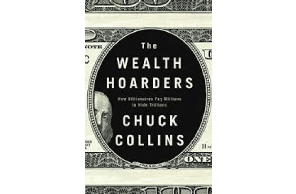How the world’s richest defend their wealth, with help from a dedicated industry
Author and scholar Chuck Collins offers an insider’s account of the ‘wealth defense industry’ and the inequality it perpetuates in his new book, “The Wealth Hoarders.”
When Chuck Collins was 26 years old, he gave away his entire inheritance to groups working for social justice.

Born into a wealthy family (his great-grandfather, Oscar Mayer, founded a prominent national lunch meat company in the United States), Collins says he was exposed early in life to the world of wealth managers and came to realize the inequalities they help perpetuate. Now an author and senior scholar at the Institute for Policy Studies in Washington, D.C., Collins draws on his personal experience, extensive research, interviews with industry professionals and ICIJ’s own investigations for his latest book, “The Wealth Hoarders.”
The book, subtitled “How billionaires pay millions to hide trillions,” offers insiders’ accounts of what’s described as the “wealth defense industry” — made up of a coalition of professionals from advisors to lawyers and accountants — and how it deploys anonymous shell companies, family offices, offshore accounts and trusts to help the world’s richest people shield their wealth from tax collectors.
We asked Collins about the wealth management industry and what’s changing in the world of wealth inequality, fair taxation, and more.
You begin your book with a fascinating anecdote from a conference for people with inherited wealth in the 1980s. You were considering giving your inheritance away, and someone asked you: What would you prove by committing class suicide? A recent headline also described you as an “upper-class traitor.” What does this mean, the idea of ‘class suicide’?
I think what happened to me in my mid-20s is I got an understanding of how the system worked, where the rules were tipped in my favor, where there was this group of trusted advisors who were there to help the very wealthy preserve their existing wealth and pass it on to the next generation. And I just was like, Oh, well, this is not good for me. And this isn’t good for society, you know, I don’t really want to benefit from the system of inherited wealth dynasties. So yeah, it was unusual to give away assets, and that’s where I kind of crossed the line. You can be kind of quirky, and you can do whatever you want with the income, but when you start to give away assets — and, as I did, give them to groups working for social change — then you’re betraying your class interests. That’s how people would look at it.
If you had to answer that question today, what were you trying to prove? And do you feel like you proved anything?
I didn’t really want to benefit from the system that allowed this kind of perpetuation of inherited wealth dynasties. So I don’t know if I was trying to prove anything other than, you know, I didn’t want to cooperate with it or benefit from it. I guess I was thinking, well, maybe I would try to make my own way. But now, honestly, in retrospect, I realize the money was just one of many, many advantages.




